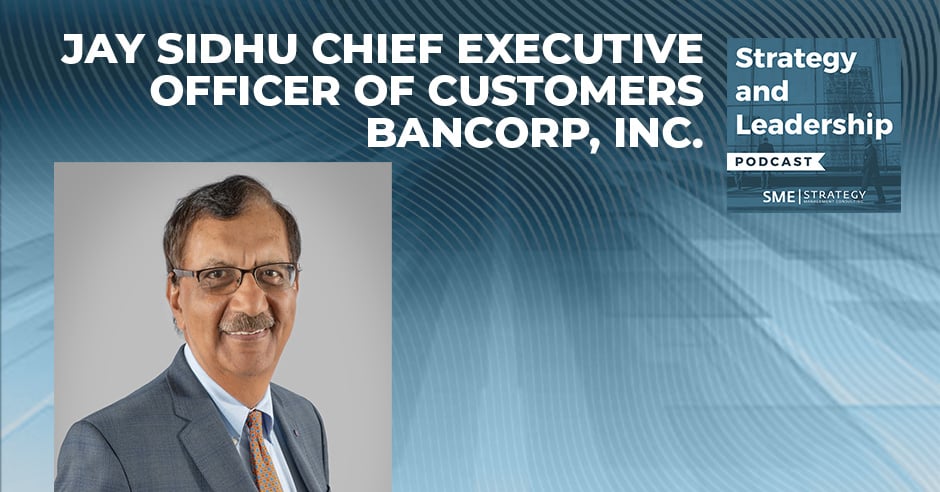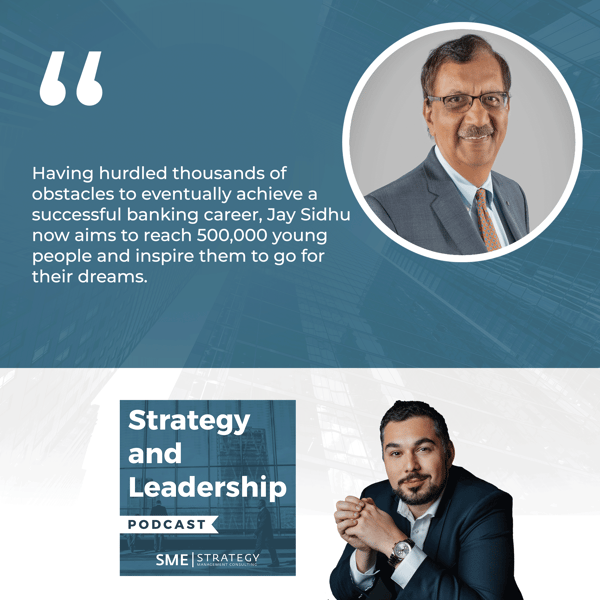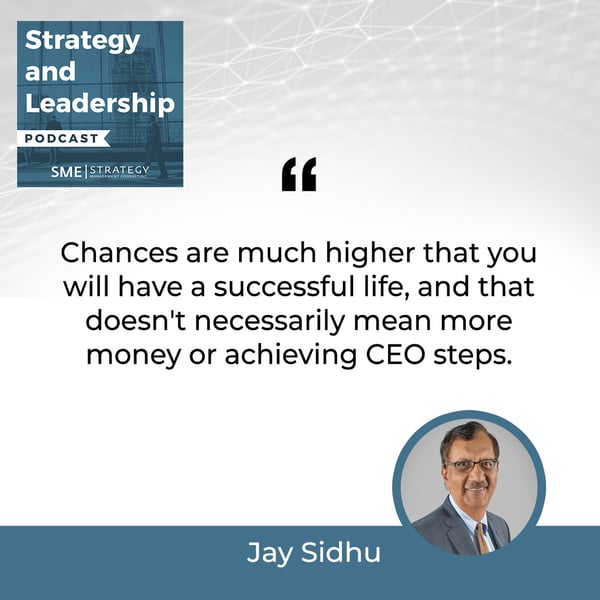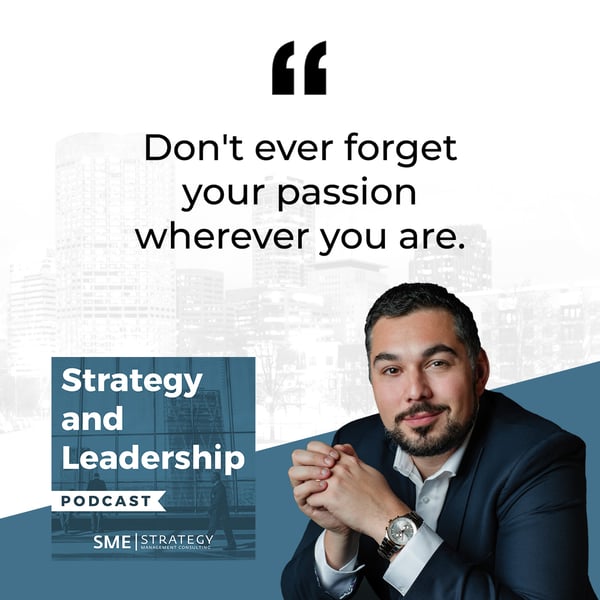
Success begins with clarity, authenticity, and continuous improvement. Keep it simple, stay engaged, and make a lasting impact. In this episode, Jay Sidhu, the Chief Executive Officer of Customers Bancorp, Inc. shares his rags-to-riches story. He generously reveals the key principles that have led him to become a Fortune 500 CEO and a prominent figure in the banking industry. Jay emphasizes the importance of clarity, authenticity, and continuous improvement as the cornerstones of leadership, along with a focus on keeping things simple and staying passionately engaged. From transforming small banks into Fortune 500 giants to his commitment to helping the youth of today achieve their dreams, Jay inspires people to pursue dreams and lead with authenticity. With the right principles and unwavering determination, anything is possible. Tune in now and drive your personal and professional growth.
Listen on Spotify: https://open.spotify.com/episode/7lc8vyV3in5jOXPlSYJu5p?si=ac1aa849d6514ca9
Listen on Apple Podcasts: https://podcasts.apple.com/ca/podcast/jay-sidhu-chief-executive-officer-of-customers-bancorp-inc/id1202449526?i=1000634617419
---
Watch the episode here
Listen to the podcast here
Jay Sidhu Chief Executive Officer Of Customers Bancorp, Inc.
My guest is Jay Sidhu who is the Chief Executive Officer at Customers Bancorp and the Executive Chairman of Customers Bank. Jay, how's it going?
It's great. Thank you.
I should also mention that you are the author of Never Ever, Ever Give Up, which I'm very excited to learn more about. Before we delve into your bank work and your bookwork, can you tell our audience a little bit about who you are and what keeps you busy?
About myself, from a professional career point of view, I'm a Chief Executive Officer of Customers Bancorp. We are a top 80 bank in the United States out of the 4,000 or so banks. I'm an entrepreneur in the banking business banking. We built that bank from nothing to the seventeenth largest in the United States. We built this from nothing to the 80th largest in the United States.
I came to the United States when I was a twenty-year-old with nothing in my pockets other than a bunch of books because I had a scholarship at a small school in Wilkes-Barre, Pennsylvania. I’m so proud and privileged to be an American citizen. It gave me an opportunity to become a Fortune 500 CEO when I was in my 40s and starting as an entrepreneur. That, in essence, is my professional life. Personally, I am married and have two children. Both of them at one time or another in their career have run New York Stock Exchange-listed companies.

I can hear from your heart that you're very grateful for the opportunities that you've been given, without a doubt, I'm sure, being tested hundreds if not thousands, if not tens of thousands of ways along the way. Everybody that you employ and work with and your family is grateful that you never ever gave up. I'm excited to be able to share your story on this episode.
Thanks. You're right. We've all, or at least I have been, through ups and downs, failures, and successes, and along the way, learned. My father was very much of an influence on my life. When I was a seventeen-year-old, with his guidance, I hitchhiked all the way from India to London and back and made $6 along the way. I left with $100 bucks and came back with $106. This was in 1973. That was the best education I had to help me in my professional and personal life so far.
That’s excellent. I may ask you about that journey, but we'll talk about the banking journey for our audience. In 2023, the regional and national banking sector was dicey at best. The bank that you've been in charge of and the turnaround that you've done there, tell me about that journey. What was it like going into that organization, looking at what needed to be done, and moving it to where it needed to get to? What are some key learnings, key experiences, or key visceral moments that you want to share with our audience?
Let me first share with you my beliefs, what I've learned in terms of leadership, and the role of a leader, to answer your question. I will also share what I’ve learned about strategy and how you develop a strategy based on my experiences of working through it to successfully build an organization, which will answer your question.
First of all, leadership, in my opinion, is nothing other than building an environment of mutual trust and respect. If that is not achieved, you need to keep working on creating the right kind of leadership environment in whatever organization you're involved in. What is the role of a leader? The role of a leader, in my opinion, is to be clear about your vision.
Be clear about your vision and strategy to achieve that vision. Be clear about your short-term goals. Be aligned so that anybody and everybody on your team when asked the same question like the question you asked me will give you an answer which is very similar. That is the most important role of a leader. It doesn't matter whether you are running a corporation, a not-for-profit, or you're running a two-man team.
Number two, in my opinion, the aspect of the role of a leader is to be clear and master what you control. We call it mastery of the internal environment. Are you engaged with a team? Do you know what's unique about your business, your strategy, and your team's abilities? Do you know what kind of skillset is needed and where are the gaps for your team to help you achieve your vision? Are they engaged? Those are the kinds of things that are controllable by the leaders.
There are lots of things that are not controllable by the leader which have a huge impact on the performance of your team. We call that external environment or the mastery of the external environment as the role of a leader such as your competitors, your technology, and your regulations around the economy.
We can use artificial intelligence as an example and its impact on your business and your client's businesses. You can be not just a master of what you control, but be very aware of things that can affect your business and be masters of that. Last but not least, which is the fourth role of a leader as I see it, is to be passionate about continuous improvement and about your team members, growth, and development as well as attraction and giving back to the communities.
Let’s use our company as an example. I've been involved in helping create, as an entrepreneur, a team that built two organizations in the United States. The first one became Sovereign Bankcorp. That one we acquired by investing our own money in a small problem, a $12 million market value company called Penn Savings Bank. We grew it into a $12 billion market value company and a Fortune 500 company called Sovereign Bancorp. We applied these same principles. At Customers Bancorp, we acquired a company with even less market value, which was a $6 million market value. We built it into a well over $1 billion in market value in about 12 years by applying the same principles. It's the role of a leader.
Another very important aspect, in my opinion, is a clarity of your top 3 to 4 critical success factors. Those are the 3 to 4 things that are non-negotiables that you will focus on because they will have more than 90% of the impact on the performance of your company, whatever they are. To answer your question about the banking industry, let me share with you what they are.
Can I ask you a different question, building on what you shared? Here's how I look at it potentially. Everything that you've shared, I agree with. We talked to a lot of leaders. I talked to a lot of CEOs on the show. Fundamentally, all of those things are true. Not everybody is turning around small banks into Fortune 500 banks. Not everybody is growing their organizations. Not everybody is doing it.
For you, outside of those conceptual principles, which I agree with, and you embody them, what do you think was the difference maker for you? If everybody did those four things, not everybody would have the same level of success. Why you? Why your team? Why the industry? Take me back to some of those key moments that helped define those successes. It's easy to look back at them, but looking forward, what were some of those tangible specific learnings if you can share them?
A very tangible specific learning is to focus on what you are saying, walking the talk. Be focused. Everybody says the same stuff. If they do it, they'll get the same kind of results. It's not rocket science. It is a consistency of performance. I said, “I don't believe in a list that is more than four.” That's why I mentioned to you the four roles of a leader. I mentioned to you four critical success factors. That's it.
Stephen Covey talks about seven habits of highly successful people. You can't remember 7, but if it's 4, you live them and talk about them with your team all the time, you are focused and clear about authentic assessment on those. Don't BS yourself. Be so authentic with your team. That's why you’re creating that atmosphere of mutual trust and respect.
When people question you, if you don't trust him, get him the hell out of your team. If you don't have that mutual respect, get him off the bus. Ask yourself, “What's wrong with it? Why aren't we having that?” You got to have that team. Be focused and clear about your roles and your critical success factors. Understand the purpose of your business. If you don't understand the purpose, you are not going to get that engagement that I talked about as the fourth role of a leader, which is passionate about continuous improvement.
Take me back to when you started in the organization, whichever one you want to choose. What were those 3 or 4 things? What did you tell your team? How did they respond? Take me and our audience to that day so we can get a sense of what were those key things that you did right away.
The four critical success factors in both organizations because we are in the banking business. 1) Never ever forget that the most important thing in banking to make it successful is that when you make a loan, you get paid back. We call it superior credit quality. That is the number one reason why banks have failed in the history of the world anywhere in every country.
The most important thing in banking to make it successful is that when you make a loan you get paid back. We call it Superior Credit quality. That is a number one reason why banks have failed in the history of the world.
2) Where you've got to charge more than what you pay for the wrong material. Believe it or not, as simple as that is, there is a number two reason why banks fail. Look at Silicon Valley and the First Republic. As an example, the wrong material comes and bankers call deposits. We sell that and call it loans and investments.
When you get your raw material and the prices of your raw material go up but you sold it at a fixed price for twenty years out of your investment portfolio at Silicon Valley Bank and First Republic Bank, the mortgages which were good credit quality but they were locked up, you get what you call a negative margin. When you market to market, you will have negative equity. As basic as those are, those are the top two reasons why banks fail or flourish.
Let me jump in before that for our audience because not all of our audience is in banking. One of the things that I'd encourage you as a reader to look at is to look at your costs. A lot of people who have become successful in business don't necessarily have that financial acumen. They might not know or you or your team might not know your model at depth and scale. You might be making assumptions.
There was a company that I ran into. The cost of lifetime value was less than their cost of acquisition. Every time they added a new customer, they were losing money. The faster they grew, the faster they went out of business. That's because they didn't have a grasp of what was at the heart of their business. Make sure if you're taking a trip from London all the way back, at least make $6 on the deal.
The third one is exactly what you're saying. 3) You have to have positive operating leverage, which means your revenues must grow faster than your expenses. Isn't that common sense? All the things I mentioned to you are common sense. 4) Make sure that you attract, develop, retain, and get off on your team the ones that don't quite fit in. You have to make those decisions. Those four things, that's it. We focused on those four. I believe these 3 to 4 things, whatever it is they are for your business, don't have to be exactly the same. For the banking, in my opinion, those are the four most important.
It sounds like if I’m paraphrasing, when you came into the organization, you made sure that people had the fundamentals. That meant the fundamentals of loans, the fundamentals of operating leverage, and the fundamentals of people and saying, “You have to do the simple things.” The best coaches in the world say, “Let's get to the basics.” It sounds like that's what you did in order to do that well at scale. Do I more or less have that right?
You are absolutely right. The fundamentals have to be clear. It's not just right, but they have to be clear. You ask yourself, “If we execute this,” and you must have a vision, “What will it take us to achieve our vision?” That's what helps you drive whatever those 3 to 4 things are. In my opinion, you have to have clarity about no more than four things that'll make 95% of the difference in your performance.
What did you do to make that clear in your organization? How did you make sure that people heard it? How did you make sure that people knew about it? How did you make sure that information was getting to the right people at the right time?
First of all, we collectively went through case studies. We don't have to be the smartest kids around. We looked at the best-performing companies and the worst-performing performing in our industry and what can we learn from them so we don't have to reinvent the wheel. You have your team and everybody engaged. The chief executive officer's job is not to lecture, but to get rid of the bureaucracy that creates obstacles towards execution. That's what I feel after the clarity of your vision. You've done the thing which I talked about as the role of a leader.
That's what we did. My job then became the easiest job, which is to get rid of the bureaucracy that prevents superior execution as companies grow. It doesn't matter what business you are in. It is very important that you understand that the biggest impediment to successful execution is things that are controllable by you. I'll call them bureaucracy.
What I hear is first, you came into the organization. You helped right the ship by making sure that people were clear on what the drivers of the business were and kept it simple. You looked at the comparables to say, “What does good look like outside of our industry so that we can replicate that internally?” Third, you focus on not trying to do everything yourself.
In fact, you remove obstacles for your team to be successful in accomplishing those 3 or 4 things. That was what you see as a leader. You are making sure that people have the information that they need, they can do their jobs, and they can do their jobs well and fast. You make sure that they're doing the right things at the right time at all times.
A leader is making sure that people have the information that they need that they can do their jobs.
You have to be engaged with your team and be very focused.
It's clear in terms of how you're talking. You are very passionate and I don't know if direct is the word, but you say it how it is. A lot of leaders have a hard time. It is a challenging environment. Don't get me wrong. There are a lot of different things that can trap you or trip you up. If you're connected to who you are, what you're doing, and why you're doing it, which is what I get from you, it makes it a lot easier to do that.
That's why I talked about how authenticity is very important and authentic self-assessment is important.
As we slowly land the plane here, we started talking about your journey both as an entrepreneur and as an immigrant going through challenges, going through unique experiences, and doing things for the first time. If you were talking to a young person in their career and journey who would aspire to be either on the board or on the executive team or leading a stock like your kids’ companies or your own self, what kind of advice would you give them to begin on that journey? You started when you were young and you got to that place in your 40s. For somebody in high school, in early management, or early twenties, what would you tell them to do? Where should they get started?
My passion is to reach 500,000 young people and inspire them to go for their dreams. Here's what I would tell them. I shared with you the role of a leader, but let me tell you what are the four principles, in my opinion, that lead to success. Chances are much higher that you will have a successful life. That doesn't necessarily mean more money or achieving chief executive officer status.

1) You must have the clarity of your dream. What do you want to achieve in life? That's a very clear vision. 2) You must be an authentic human being. All great leaders are great human beings first. To my opinion, being truthful to yourself, authentic, self-aware, and emotionally mature are very critical aspects of success and happiness in life. Happiness is an important facet of life.
3) Whatever you are doing, you do it better than anybody expects you to do it. At this average, being mediocre and being satisfied in the 9:00 to 5:00 type of thing or, as an example, in a job doesn't cut it, in my opinion. The return on investment or return on the time for that little extra is 10X. Most people stop with what's expected of them. Do you want to go to a great college? Do well beyond anybody's expectation. In school, it’s the same way. It doesn't matter.
4) Last but not least, in my opinion, is being passionate about continuous learning. Something significant yet to do must always be in front of you. Give back and help others. These are the same four. You can apply them in different ways to the business environment. It's so simple. The obvious isn't so obvious. The simple isn't so simple in the mind. In my opinion, if you can focus on some of these things, you have dramatically increased the chances of happiness and success in life.
The obvious isn't so obvious. The simple isn't so simple.
That’s excellent. The happiness piece is there. When I talk to a lot of youth, it is like, “It's easier for you to be happy because you're at the end of the journey,” or whatever it is. It’s wherever you're at. You have to be happy with where you're at, not in the past and not in the future because you'll miss life in the moment. Everything that you've shared including the authenticity and the focus on learning helps you appreciate where you're at while going to where you want to go. As we finish up, tell our audience a little bit about your book and where can they learn more about you and your mission to help these future youths.
I've written a memoir, which is Never Ever, Ever Give Up. It has fortunately become an Amazon and a Wall Street Journal bestseller. I end the book with something significant yet to do. There are four things that I've set out with something significant yet to do, which are passions for me because I'm 70 years old. 1) Help the businesses that I'm engaged in to become something that will be built to last. 2) Help the youth.
I'm trying to reach 500,000 young people around the world. I belong to chief executive officer organizations, other organizations, and colleges and universities, trying to engage them. Why 500,000? It is because I would like to make an impact on 5,000. The fact of the matter is only 1% of the people who listen pay attention to it. 99% will think about all the reasons why this won't work, which is fine. Let them go. That's what creates the opportunities for that 1%.
3) I want to play at the top 100 golf courses in the world and America. I have about 70 more to go in each of those phases as such. I want to travel the world with my wife. Those are my goals for something significant yet to do, which I gave you on the last page of my book. It's my life story, which talks about everything we discussed in the show.
I appreciate your sharing. I appreciate you coming on. I appreciate your passion. It's not a spark. It's a raging fire. There is a lot left to do. I wish you the best of luck in getting to your 100 golf courses. Typically, we get about 6,000 people tuning in to an episode. You're part of a community of 6,000 including YouTube and all the other stuff, which is pretty cool. You can add 6,000 to your list. Sixty people tuning in will probably do something about it. You can take that 60 out of 5,000, and hopefully, we make an impact with them.
One is very important. That's why I am spending time with you. At least one.
I'm with you. For you that’s reading, I do this for you and it sounds like Jay does this for you. We have a passion to help you be successful, whatever that success is.

Anybody who wants to learn more about some of this, please go to NeverEverEverGiveUp.com.
That’s also JaySSidhu.com. Thank you for being here. It has been a pleasure. I appreciate the time.
Same here. Thank you.
Don’t ever forget your passion. Wherever you're at, there's a passion for what you care about. There's a passion for your people. As Jay shared with his leadership tips, keep it simple. Focus on what moves the needle. Make sure everybody knows what that is. Keep getting better and keep moving forward. Jay, thank you again for being here. Folks, thank you for tuning in. I appreciate it. I hope we made a difference in your life and the lives of your people. This has been the show. I'll see you in the next episode.
Important Links
About Jay Sidhu
 Jay Sidhu serves as Chief Executive Officer of Customers Bancorp, Inc., and Executive Chairman of Customers Bank. Under Jay’s management, Customers Bank grew from a $250 million troubled bank to over $20 billion in assets in approximately ten years.
Jay Sidhu serves as Chief Executive Officer of Customers Bancorp, Inc., and Executive Chairman of Customers Bank. Under Jay’s management, Customers Bank grew from a $250 million troubled bank to over $20 billion in assets in approximately ten years.
Prior to joining Customers Bank, he served as the Chairman and Chief Executive Officer of Sovereign Bancorp, Inc. There, he grew the organization from an Initial Public Offering of $12 million into the 17th largest banking institution in the country with a market cap of $12 billion at his retirement.
Sidhu has received numerous recognitions in the industry, including Financial World's CEO of the Year, Turnaround Entrepreneur of the Year, and was named the Large Business Leader of the Year by the Chamber of Commerce. He is the author of Never Ever, Ever Give Up. Learn more at JaySSidhu.com.


